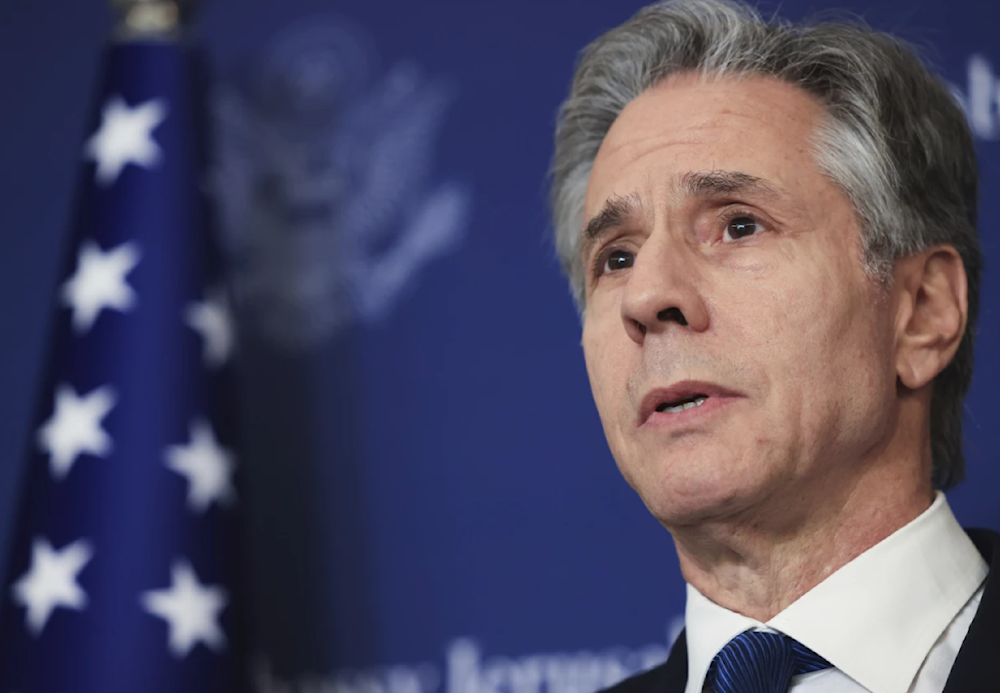Blinken to head to Egypt, Qatar, after adopting Netanyahu Proposal
After agreeing to the Israeli proposal which the Resistance labeled as a full submission, Blinken said Hamas needs to accept it.
-

US Secretary of State Antony Blinken speaks to the media at the David Kempinski Hotel in Tel Aviv on August 19, 2024. (AP)
Following discussions with the Israeli occupation on Monday, US Secretary of State Antony Blinken said that he will fly to Egypt and Qatar to confer with their leaders on the procedures needed to achieve Hamas' support for the recent bridging proposal on a Gaza truce.
Blinken told the press that he looks forward to consulting with President el-Sisi, Emir Sheikh Tamim, and other critical colleagues in both countries on the immediate steps ahead, particularly what needs to be done.
After agreeing to the Israeli proposal which the Resistance labeled as a full submission, Blinken said Hamas needed to accept it. He said that the next critical step is for Hamas to agree to the ceasefire plan, after which negotiators would hash out the terms of the agreement "to ensure that Hamas comes along."
He described Washington's recent alleged efforts to establish a ceasefire in the Gaza Strip as "probably the best, maybe the last opportunity", calling on all parties to allow the finalization of the deal.
Ahead of his meeting with the Israeli occupation's president, Isaac Herzog, Blinken told reporters that the upcoming round of talks is a "decisive moment" and potentially the last opportunity to return the captives and implement a ceasefire "to put everyone on a better path to enduring peace and security."
"It is time for everyone to get to yes and to not look for any excuses to say no," he added.
A Palestinian source involved in the negotiations revealed to Al Mayadeen details of a new US proposal for a ceasefire in Gaza and a prisoner exchange, emphasizing that it “completely contradicts the agreement that both parties had previously accepted.”
According to the Palestinian source, the new American proposal "builds on the May framework but has been adjusted to accommodate and align with the latest Israeli conditions and demands."
The source further explained to Al Mayadeen that, regarding the ceasefire, the US proposal “does not call for a permanent ceasefire.” Instead, the ceasefire is being discussed as part of a second phase with a clearly defined time limit.
The source highlighted that the US proposal emphasizes that “unless Hamas agrees to the Israeli demands, the occupation will resume military operations in the second phase.”
He also stressed that the proposal "does not include a comprehensive
Hamas: Netanyahu fails to reach an agreement
On Sunday, according to a statement made by the Palestinian Islamic Resistance Movement Hamas, the movement has "acted with full responsibility" toward mediators in Qatar and Egypt and considered the proposals aimed at reaching an agreement to stop the aggression in Gaza and to conclude a captive agreement.
The movement reported that this was done to "spare the blood of our people and put an end to the genocide, ethnic cleansing. and brutal massacres" being waged on the Palestinian people by the Israeli occupation.
The movement also said it endorsed the mediators' plan in May welcomed Joe Biden's statement and the text of the UN Security Council resolution, and replied positively to the mediators' proposal on July 2, 2024.
After the trilateral statement, Hamas said it urged mediators to present a plan to implement the proposal so negotiations do not become a vicious cycle, referring to how it has been made clear that Netanyahu's stalling and adding obstacles to prolong the aggression and buy himself more time in power.
"After listening to the mediators regarding what transpired in the latest round of talks in Doha, it became clear to us once again that Netanyahu is still placing obstacles in the way of reaching an agreement, setting new conditions and demands aimed at thwarting the mediators' efforts and prolonging the war," the statement detailed.
Hamas detailed how the new proposal aligns with Netanyahu's conditions, particularly his refusal to a permanent ceasefire, the complete withdrawal from the Gaza Strip, his insistence on continuing to occupy the Netzarim axis, the Rafah crossing, and the Philadelphia corridor."
Netanyahu set new conditions for the prisoner exchange and backed down on other commitments, which prevented the completion of the exchange deal.
The resistance movement held Netanyahu "fully responsible for the failure of the mediators' efforts, the obstruction of reaching an agreement, and full responsibility for the lives of his captives, who are exposed to the same danger as our people due to his continued aggression and systematic targeting of all aspects of life in the Gaza Strip."

 5 Min Read
5 Min Read








